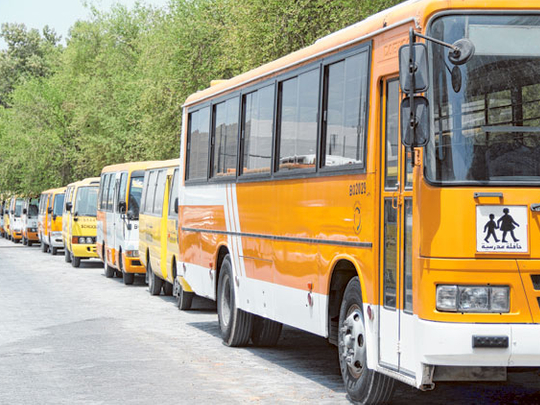
Abu Dhabi: All public school buses across the emirate of Abu Dhabi will soon be fitted with tracking systems to ensure the safety and comfort of schoolchildren using them, the Abu Dhabi Education Council (Adec) announced on Sunday.
Buses serving a number of schools in the emirate have already been fitted with the tracking systems as part of an ongoing pilot project, Khalid Al Ansari, manager of the school services division at the Adec, told Gulf News.
These systems, which are being installed in collaboration with public transportation company Emirates Transport, will help determine the number of school buses needed, as well as routes with the shortest travel times.
“The system will be fully implemented across buses serving all public schools in the emirate by the start of the 2013-2014 academic year,” Al Ansari said.
“[Once the tracking devices are in place], parents will be able to obtain bus travel details for their children at the beginning of each academic year. The system will also provide details such as arrival time, time to be spent in the bus, driver’s name and bus number,” Al Ansari added.
According to a statement sent by the Adec on Sunday, nearly 70 per cent of children at public schools in Abu Dhabi take the bus to school.
In the 2012-2013 academic year, Emirates Transport is providing 1,813 buses to Adec to facilitate travel to public schools, evening centres, activity venues and adult education centres.
Emirates Transport has also been contracted to supply 1,370 bus supervisors. The number of buses and supervisors tends to increase by about 5 per cent each year, the Adec statement added.
The introduction of a Student Card system is also being coordinated by Adec and Emirates Transport to document student movement in and out of the bus.
“Parents will therefore be notified via SMS if there are any changes in travel plans, including delays, destination changes, bus breakdown or a child not leaving the bus. This way, parents can follow up student travel details and be reassured that they are safe,” Al Ansari said.
Other measures to enhance schoolchildren’s safety in buses across the UAE were also implemented at the beginning of the 2012-2013 academic year in September.
These included an instruction by the Emirates Standardisation and Metrology Authority (Esma) to install speed control devices that limit the maximum speed to 80 kilometres per hour, as well as to reduce window tinting from 50 per cent to 30 per cent.
The Esma also instructed operators to remove all sharp objects from school buses in the UAE. School buses must also be no older than 15 years. The use of mobile phones on school buses has also been banned.
The installation of GPS tracking systems and security cameras were however deemed optional for schools and operators, despite suggestions from many parents to make it mandatory.












